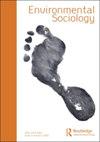在法国从事再利用、收集和零浪费:物质的公民生态
IF 2.4
Q3 ENVIRONMENTAL STUDIES
引用次数: 0
摘要
摘要美国和西欧都出现了一系列回收、再利用和减少废物的做法。本文根据法国国家生态转型机构ADEME 1计划委托进行的一项社会学研究的结果,探讨了它们揭示一种新形式的环境参与的方式。在法国背景下讨论了废物政策和环境行动主义之间的联系,这表明,为了理解这些举措的变革影响,需要一个理论框架,结合公民参与、活动家与经济世界之间的关系以及可持续唯物主义的文献。这一联合理论框架用于分析这些反废物倡议中产生的物质的公民生态学,改变社会与废物的关系。本文章由计算机程序翻译,如有差异,请以英文原文为准。
Engaging in reuse, gleaning and zero waste in France: a civic ecology of matter
ABSTRACT A wide array of practices of recycling, reuse and waste reduction has emerged both in America and in Western Europe. This article examines the ways in which they reveal a new form of environmental engagement, based on the findings of a sociological study commissioned by the French national agency for the ecological transition ADEME’s 1 programme. Having discussed the links between waste policy and environmental activism in the French context, it shows that, to appreciate the transformative reach of these initiatives, a theoretical framework is needed that combines literature on citizen participation, on the relationships between activist and economic worlds, and on sustainable materialism. This joint theoretical framework is used to analyse the civic ecology of matter that emerges from these anti-waste initiatives, transforming society’s relationship to waste.
求助全文
通过发布文献求助,成功后即可免费获取论文全文。
去求助
来源期刊

Environmental Sociology
ENVIRONMENTAL STUDIES-
CiteScore
4.60
自引率
12.00%
发文量
34
期刊介绍:
Environmental Sociology is dedicated to applying and advancing the sociological imagination in relation to a wide variety of environmental challenges, controversies and issues, at every level from the global to local, from ‘world culture’ to diverse local perspectives. As an international, peer-reviewed scholarly journal, Environmental Sociology aims to stretch the conceptual and theoretical boundaries of both environmental and mainstream sociology, to highlight the relevance of sociological research for environmental policy and management, to disseminate the results of sociological research, and to engage in productive dialogue and debate with other disciplines in the social, natural and ecological sciences. Contributions may utilize a variety of theoretical orientations including, but not restricted to: critical theory, cultural sociology, ecofeminism, ecological modernization, environmental justice, organizational sociology, political ecology, political economy, post-colonial studies, risk theory, social psychology, science and technology studies, globalization, world-systems analysis, and so on. Cross- and transdisciplinary contributions are welcome where they demonstrate a novel attempt to understand social-ecological relationships in a manner that engages with the core concerns of sociology in social relationships, institutions, practices and processes. All methodological approaches in the environmental social sciences – qualitative, quantitative, integrative, spatial, policy analysis, etc. – are welcomed. Environmental Sociology welcomes high-quality submissions from scholars around the world.
 求助内容:
求助内容: 应助结果提醒方式:
应助结果提醒方式:


